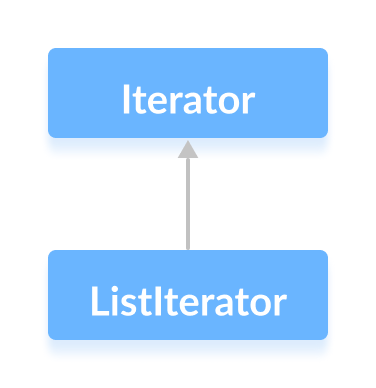Java ListIterator
In this tutorial, we will learn about the Java ListIterator interface with the help of an example.
The ListIterator interface of the Java collections framework provides the functionality to access elements of a list.
It is bidirectional. This means it allows us to iterate elements of a list in both the direction.
It is only applicable for List collection implemented classes like arraylist, linkedlist etc. It provides bi-directional iteration.
ListIterator must be used when we want to enumerate elements of List. This cursor has more functionality(methods) than iterator.
ListIterator object can be created by calling listIterator() method present in List interface.

Example:
// Java program to demonstrate ListIterator
import java.util.ArrayList;
import java.util.ListIterator;
public class Test
{
public static void main(String[] args)
{
ArrayList al = new ArrayList();
for (int i = 0; i < 10; i++)
al.add(i);
System.out.println(al);
// at beginning ltr(cursor) will point to
// index just before the first element in al
ListIterator ltr = al.listIterator();
// checking the next element availabilty
while (ltr.hasNext())
{
// moving cursor to next element
int i = (Integer)ltr.next();
// getting even elements one by one
System.out.print(i + " ");
// Changing even numbers to odd and
// adding modified number again in
// iterator
if (i%2==0)
{
i++; // Change to odd
ltr.set(i); // set method to change value
ltr.add(i); // to add
}
}
System.out.println();
System.out.println(al);
}
}
output:
[0, 1, 2, 3, 4, 5, 6, 7, 8, 9]
0 1 2 3 4 5 6 7 8 9
[1, 1, 1, 3, 3, 3, 5, 5, 5, 7, 7, 7, 9, 9, 9]
Methods in Java list Iterator Interface
| Methods |
Description |
| hasNext() |
returns true if there exists an element in the list |
| next() |
returns the next element of the list |
| nextIndex() |
returns the index of the element that the next() method will return |
| previous() | returns the previous element of the list |
| previousIndex() | -returns the index of the element that the previous() method will return |
| remove() | removes the element returned by either next() or previous()
|
| set() | replaces the element returned by either next() or previous() with the specified element |

